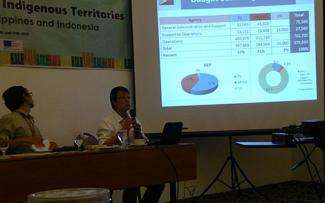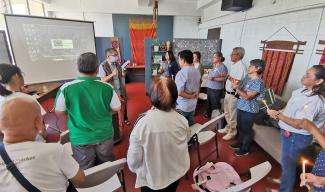Realising the sovereignty of indigeous people is closely linked to recognition of rights over indigenous areas. Several Asian countries have laws that recognise indigeous rights over their indigenous areas, however, state provisions usually filled with problems and are very slow.
This is different to the Philippines, who since 1997 have had the Indigenous Peoples Act. The Philipines is an Asian country who has established a special institution to serve the interests of its indigenous peoples including registration and providing titles for indigenous areas The National Commission on Indigenous Peoples - NCIP.
Even though constitutionally the existence of indigenous peoples in Indonesia are recognised, compared to the Philipines, we are still behind. In Indonesia, there is no government agency taksed specifically to serve the needs of indigenous people to gain recognition over their indigenous lands. Indigenous forests and lands are only recognised after being established in a regional regulation (perda).
As part of the efforts to push for recognition of rights to land for indigenous peoples in Indonesia, the Customary Land Registration Body (Badan Registrasi Wilayah Adat -BRWA) held a workshop: “Towards Customary Recognition. Lessons learned in the Philipines and Indonesia†on 16-17 February 2015 at Hotel Grand Cemara, Menteng Jakarta. This workshop presented Abdon Nababan-General Secretary of the Indigenous Peoples of the Archipelago Alliance (AMAN), Kasmita Widodo-Head of BRWA and Forester Marlea Munez-Director National Commission on Indigenous Peoples (NCIP), Philipines as resource persons.
Currently the BRWA has made efforts to make the recognition process easier in Indonesian indigeneous areas and presenting the existence of indigenous peoples and areas. BRWA acts as an indigenous area administrative agency, so that indigenous maps can be seen by various parties, particularly the government.
“BRWA's registration process has been ongoing for three years. At the end of 2014, BRWA along with AMAN and JKPP handed over 4.8 million hectares of indigenous maps to the government, namely the MoF-E and BP REEd,†Kasmita Widodo explained.
The new government's commitment towards indigenous peoples was something that seemed hopeful in 2015. However, the commitment that accompanied the accelearation of the Indigenous Peoples Bill, which at the time was in Parliament disappointed indigenous peoples. In the new government proposal, this Bill failed ot make the list.
Another commitment was to create a permanent special institution look after indigenous peoples. In regard to this, Abdon Nababan said that AMAN, along with other organisations are working with Cabinet Secretary Andi Widjayanto to prepare a presidential decsion on the Presidential Task Force on Indigenous Affairs. One of the tasks is to prepare a definite framework on recognition and protection of rights, including registration and legal recognition of indigenous lands. Unfortunately the work and meetings failed to come about due to the KPK (Anti Corruption Commision) and POLRI (Indonesian National Police) polemic.
“This is what we have been waiting for 70 years since Indonesia's independence. None of this can be done because there is no administrative system of indigenous areas,' said Abdon.
According to Abdon, there are currently 166 indigenous people incarcirated because there is still no permanent mechanism and the laws are yet to be passed. This was to be one the task force's things to do. Almost 70 percent of indigenous lands are now overlaid with Land Use Permits (IUPH) for forestry,mining etc. these permits are a form of encroaching on indigenous lands and also impacts the environment.
Meanwhile, Marlea Munez, Director National Commission on Indigenous Peoples (NCIP) stated that there are two categories of indigenous land titling in the Philiines, which are Ancestor Domain and Ancestor Land. Ancestor Domain is indivudual however the lands are owned collectively and cannot be sold.
Ancestor Land titles can be given to a clan, and usually is given when the land cannot be validated or referred to with a different form of ownership (the legal status can be different). If it has been reclarified then it can be used for other things, but the deadline is 2017 and there is still no guidance. Indigenous lands, whether ancestor domain or ancestor land until now has not been sold due to protection basen on types of ownership.
“The existence of Indigenous Political Structure (IPS) is very important to document and if necessary, should be further strenghtened before permanent legal recognition of customary areas,†Marlea Munex explained.
Anticipating IPRA violations, for example, companies who are occupying indigenous lands without permits, IPRA will provide legal protection. Free legal aid is given through NCIP who has a legal process equivalent to a state court, after that it can be appealed to the Supreme Court to return their rights, which has been robbed from them or if human rights violations occur.




